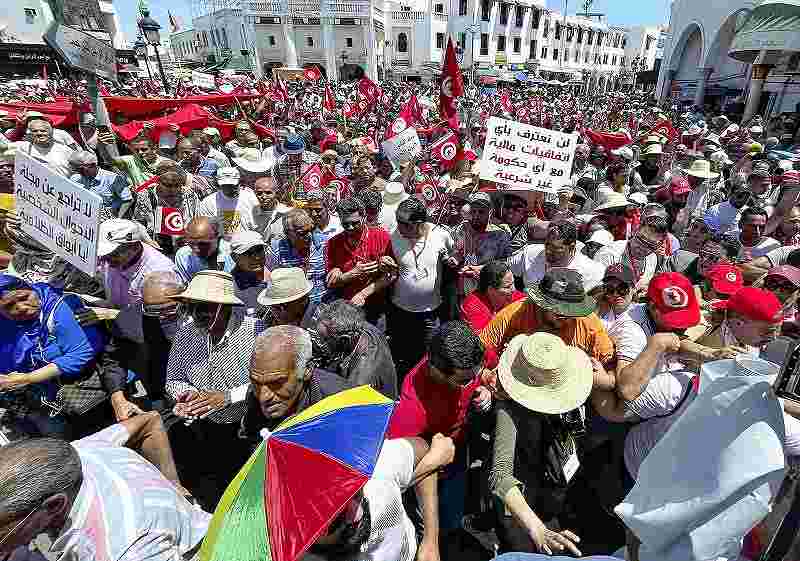
Demonstrators gather as they hold flags during a protest in opposition to a referendum on a new constitution called by Tunisian President Kais Saied in Tunis on June 18.
1:00 JST, July 22, 2022
CAIRO — Tunisian President Kais Saied announced a draft to amend the Constitution to increase presidential power, sparking criticism that he is trying to return the country to a dictatorship.
A national referendum over whether the amendment will be approved is scheduled for Monday. Multiple protests have been held across Tunisia, which is seen as the only successful nation to come out of the Arab Spring — a series of pro-democracy movements in the Middle East aiming to topple long-time dictatorships in the region.
Term limits
The draft, released in late June, stipulates that a president will be able to submit bills for laws, budgets as well as treaties, in addition to what is already included in the current Constitution, such as national security and diplomacy.
An article regarding the procedures to dismiss a president is deleted in the draft but states that the president’s term, which is currently limited to two terms for a total of 10 years, can be extended in times of national emergencies.
It also states that a president does not need the approval of parliament when cabinet members are appointed or dismissed, and a president will be able to appoint judges.
The former dictatorship in Tunisia fell in 2011 during the Arab Spring movement, which began with protests in Tunisia in December 2010 and spread to nearby countries. In Tunisia, the movement was called the Jasmine Revolution, named after the national flower. After the end of the dictatorship, the country democratically held presidential and parliamentary elections, and after two years of discussions, it established its current constitution in 2014, under which the president and prime minister share authoritative powers.
Said Benarbia, director of the Middle East and North Africa Program of the International Commission of Jurists, an international nongovernmental organization based in Switzerland, tweeted that the draft constitution will result in “an omnipotent President, a powerless Parliament and a toothless judiciary,” regarding the current situation.
Sadok Belaid, who led a committee in charge of the draft, told local media that the draft announced by the president is completely different from the original version. He expressed his dissent, saying the draft will lead to a dictatorship.
Taking power
Saied was elected president for the first time in October 2019. He was a scholar specializing in the constitution, and although he lacked political experience, he was supported by those who gave up on existing political parties in the wake of an economic slump that followed the fall of the dictatorship and a string of corruption cases.
However, it proved difficult to make headway regarding economic and political reforms as a result of Saied’s conflicts with parliament, in which lawmakers of existing parties held many seats, and the prime minister, who was backed by parliament.
In July 2021, Saied dismissed the then prime minister and suspended parliament, citing the Constitution, as it gave the president the authority to do so in the event of an emergency. In March, he ordered the dissolution of parliament. In June, he dismissed 57 court judges — alleging that they were involved in bribery and other wrongdoings — to strengthen his influence.
It is assumed that the aim of Saied’s constitutional amendments is to concentrate power and allow him to permanently suppress his opponents.
In various parts of Tunisia, residents are protesting, saying the president is pushing for the amendments for his own personal benefit.
The slow economy has fueled the opposition, as spreading coronavirus infections have greatly impacted tourism, which is a major industry in Tunisia. Prices have also been surging and unemployment remains high at 16%.
Losing support
Opposition parties have been holding demonstrations. Labor unions, which supported the pro-democracy movement, became increasingly hostile toward the president, leading more people to turn their backs against Saied. According to a survey conducted by a private-sector organization, Saied’s approval rate was about 50% last summer but was at about 20% in June.
The president said if the draft is approved, he will hold parliamentary elections in December and then normalize the national regime.
However, if Saied continues to take a hard-line stance, the division in the country might quickly accelerate.
Tunisia is at a crossroad to determine whether democracy, which had been taking root, can continue.
Top Articles in World
-

Israeli Ambassador to Japan Speaks about Japan’s Role in the Reconstruction of Gaza
-

Videos Plagiarized, Reposted with False Subtitles Claiming ‘Ryukyu Belongs to China’; Anti-China False Information Also Posted in Japan
-

North Korea Possibly Launches Ballistic Missile
-

Chinese Embassy in Japan Reiterates Call for Chinese People to Refrain from Traveling to Japan; Call Comes in Wake of ¥400 Mil. Robbery
-

Pentagon Foresees ‘More Limited’ Role in Deterring North Korea
JN ACCESS RANKING
-

Japan PM Takaichi’s Cabinet Resigns en Masse
-

Japan Institute to Use Domestic Commercial Optical Lattice Clock to Set Japan Standard Time
-

Israeli Ambassador to Japan Speaks about Japan’s Role in the Reconstruction of Gaza
-

Man Infected with Measles Reportedly Dined at Restaurant in Tokyo Station
-

Man Infected with Measles May Have Come in Contact with Many People in Tokyo, Went to Store, Restaurant Around When Symptoms Emerged



















